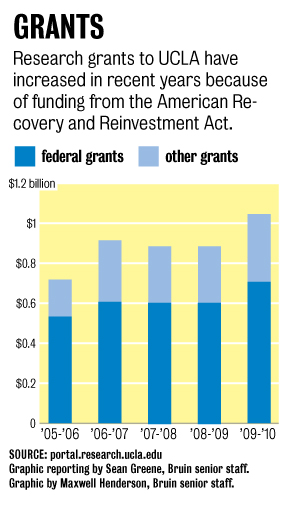Federal research dollars may be on their way out of UCLA laboratories.
Traditionally, UCLA researchers have relied on federal grants to conduct their experiments and pay the salaries of graduate and post-doctoral students.
In the 2009-2010 fiscal year, about 68 percent of funding for UCLA research came from federal money.
Patricia Johnson, a professor of microbiology, immunology and molecular genetics, said the decrease in funding will affect smaller labs the most.
If a small lab relies on a single grant and the grant doesn’t get renewed, “everything stops,” Johnson said.
Not only does the research stop, but the trained lab assistants might also be let go.
“It just causes great loss on and beyond just the loss of money,” Johnson said. “It’s a big problem that we face, and we’re not alone obviously. A lot of the federally funded programs are getting cut.”
For 40 years, the National Institutes of Health’s funding of biomedical research increased about 8 percent per year.
Beginning in 1999, Congress doubled NIH funding over the next five years, which many researchers called “The Doubling.”
Since then, however, funding has fallen flat, and when adjusted for inflation, it has in fact gone down, said Dr. Leonard Rome, senior associate dean of research for the David Geffen School of Medicine.
The American Recovery and Reinvestment Act of 2009 mitigated this decline, awarding UCLA $227,525,164 in grants and creating more than 380 jobs.
Some money is still circulating, but stimulus funds will dry up in the next few years.
“Research without funding is a hallucination,” said Erna Aridzanyan, research director for the Strategic Research group in the Office of the Vice Chancellor for Research. “I think it’s going to be more challenging because the funding is decreasing.”
Now the university must look beyond governmental grants to continue its research. This includes reaching out to foundational and industrial sources, Rome said.
Funding from industry often has strings attached, Rome said. To prevent outside influence, there are many restrictions placed around industry-supported research.
For example, researchers who are also patent holders in a drug’s development may not participate in the clinical trials. To do so would be a conflict of interest, Rome said.
Aridzanyan said in other projects, industry partners might work with UCLA researchers to develop certain technologies or create a program for educational purposes.
These projects, in turn, benefit UCLA once the developed technology is sold to the private sector. Medical research also pays dividends back to the university, Aridzanyan said.
But first, the process of finding an industry partner becomes akin to a sales pitch.
“You almost have to convince them in a way that it will benefit them,” she said.
“The challenge is really to find the right sponsor for (the) research.”
Psychology Professor Michael Fanselow said the lack of research funding will also affect undergraduates looking for research experience.
Without funding, he said, “students can’t get involved.”

I think all federal funds to UCLA should be stopped until they allow professor fink to stay and teach his conservative class, what happened to free speech?